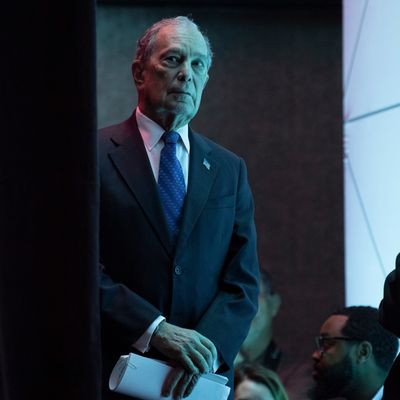
Until a few months ago, Michael Bloomberg was a fervent proponent of racially discriminatory policing, financial deregulation, and Social Security cuts. He endorsed George W. Bush at the 2004 Republican National Convention, campaigned with Rudy Giuliani in 2009, and spent $11.7 million helping a pro-life Republican senator narrowly defeat a female Democratic challenger in Pennsylvania just four years ago. Slight of stature, and nasally monotonous in intonation, the billionaire exudes the charisma of a W-2 form.
For over a decade now, Elizabeth Warren has been the leading champion of consumers, workers, and low-income debtors in Democratic politics. She established a federal agency dedicated to constraining the abuses of predatory financiers, advocated for the expansion of Social Security benefits, and lent her voice to the causes of a wide array of Democratic interest groups, from the AFL-CIO to Planned Parenthood to the Movement for Black Lives. Eloquent in argumentation, and folksy in affect, the populist legal scholar radiates charm (at least, in the eyes of one significant Democratic-primary constituency).
And by the end of Tuesday night, Bloomberg will have won more delegates than Warren in the 2020 Democratic primary, according to the New York Times’ current forecast.
Warren has plenty of political liabilities, and her campaign made no small number of tactical errors. But there is exactly one reason why a 77-year-old man with a history of opposing core Democratic priorities — and an inveterate habit of publicly disparaging labor unions, farmers, and factory workers — is currently poised to take more delegates than Warren to the 2020 DNC: He is over 5,000 times wealthier than she is.
Bloomberg’s $60 billion net worth allowed him to plow more than $500 million into his 2020 campaign and still not spend money faster than he earned it. Those funds — combined with his previous exorbitant investments in the Democratic Party and associated interest groups and institutions — enabled the billionaire to not only inundate the public with paid messaging across every form of media, and mount a first-rate campaign organization in virtually every Super Tuesday state, but also to secure an array of high-profile endorsements. All this was sufficient to buy Bloomberg more than 100 delegates — and a victory over Tulsi Gabbard in the Democratic caucus in American Samoa (where the Bloomberg campaign employed seven full-time staffers). But it was inadequate to make him a serious contender for the Democratic nomination.
For opponents of plutocracy, this should be a source of comfort but not of complacency. Neither Bloomberg nor his more benign (and vastly less wealthy) fellow billionaire Tom Steyer were ever very likely to win blue America’s primary. In the ultrahigh-visibility context of a presidential campaign — in which all major contenders have abundant access to earned media — money is no trump card. Joe Biden’s commanding performance Tuesday night illustrated this point as clearly as Bloomberg’s lackluster one. After his dismal showings in Iowa and New Hampshire, the former vice-president’s campaign was too broke to launch any significant national ad campaign, or mount a field organization in Super Tuesday’s battlegrounds. None of that mattered. Earned media from his victory in South Carolina and subsequent endorsements were sufficient to secure him a stronger showing than most analysts considered possible.
But if Bloomberg’s money was sufficient to make him a more successful candidate than Elizabeth Warren, how easily could a similar investment have delivered the Democratic primary to a less holistically uncompelling candidate? Which is to say: How much doubt is there that Bloomberg could have made Cory Booker or Kamala Harris or Pete Buttigieg the Democratic nominee if he had wanted to?
More ominously: If Bloomberg could buy himself 100-plus delegates without putting a dent into his own net worth, what policy outcomes couldn’t Amazon CEO Jeff Bezos buy if sufficiently motivated?
There’s nothing new about billionaires exercising outsize influence over American politics, of course. George Soros, Sheldon Adelson, Charles Koch, the Mercer family, and other politically engaged plutocrats have already doled out eye-popping sums to political causes, and secured major returns on those investments. Meanwhile, the one percent as a whole has quite clearly made its money talk on Capitol Hill: In 2017, as Americans faced (among other things) a drug-overdose epidemic, skyrocketing health-care costs, decaying infrastructure, and a climate crisis, the U.S. Congress decided that the best thing it could possibly do with $1.5 trillion of borrowed money was give large tax breaks to rich people.
But, as Bloomberg just demonstrated with his historically expensive campaign, America’s billionaires’ current political spending represents a minuscule fraction of what they could afford to spend. Even the Soroses and Koches of the world have been pinching their pennies. As Jonathan Chait noted earlier this year, total spending by both sides in the 2016 election barely exceeded $1 billion. That is less than one percent of Bezos’s net worth.
Bloomberg’s singular lack of personal appeal ultimately rendered his campaign into a bizarrely structured redistributive program. But one day, a less egotistical megabillionaire could put Bloomberg’s blueprint to more nefarious use. Progressives must do everything they can to ensure our democracy is in sturdier shape when and if that oligarchic would-be overlord arrives.






























